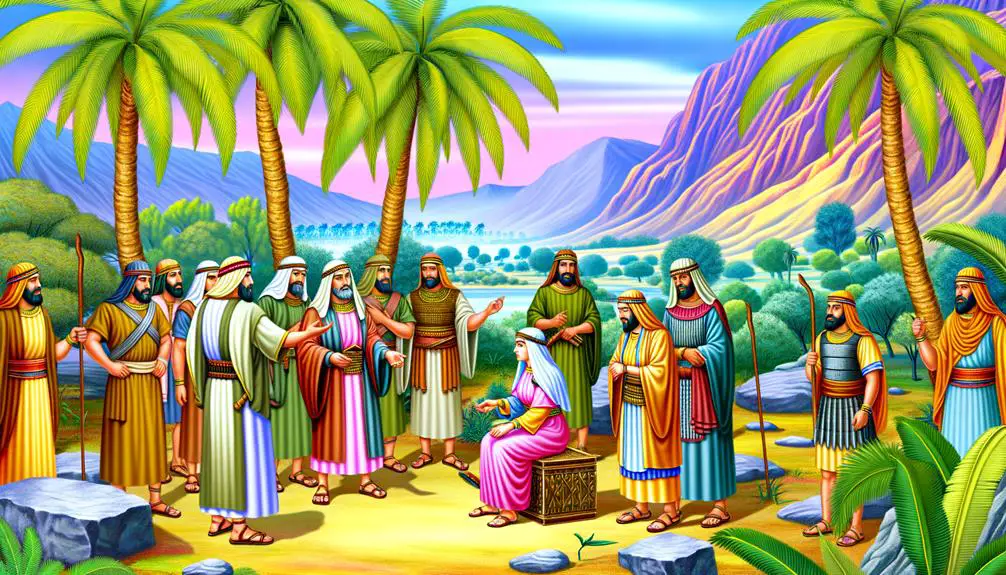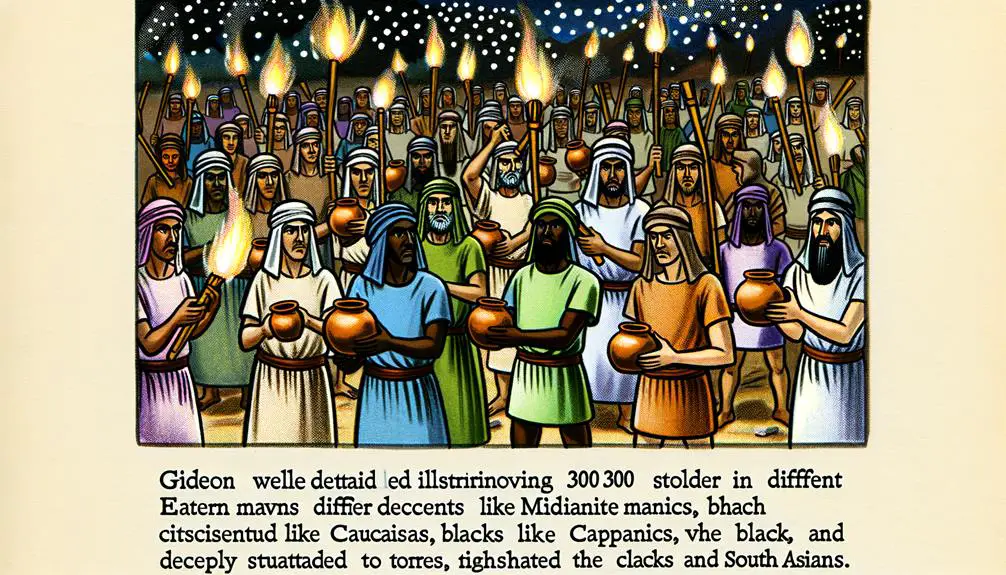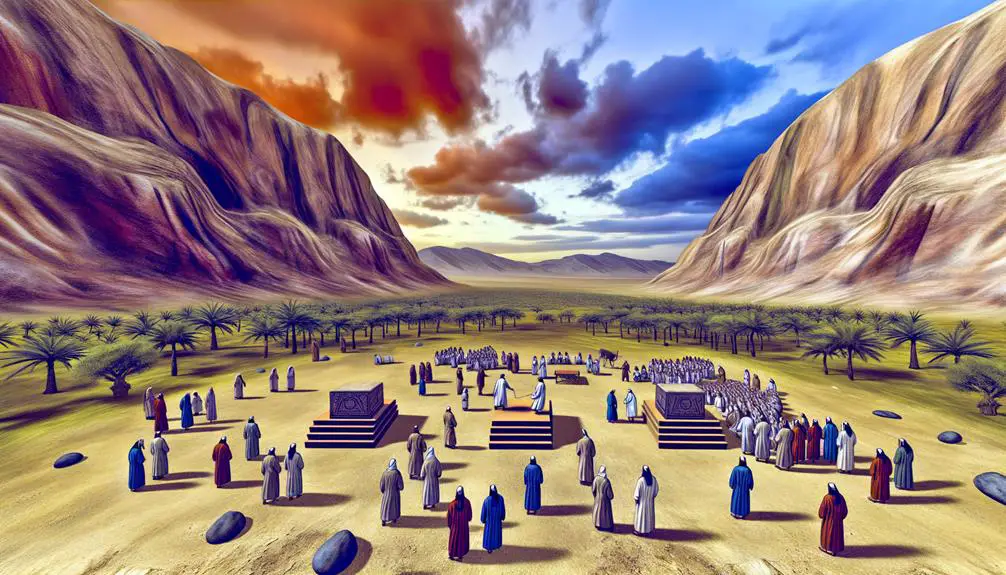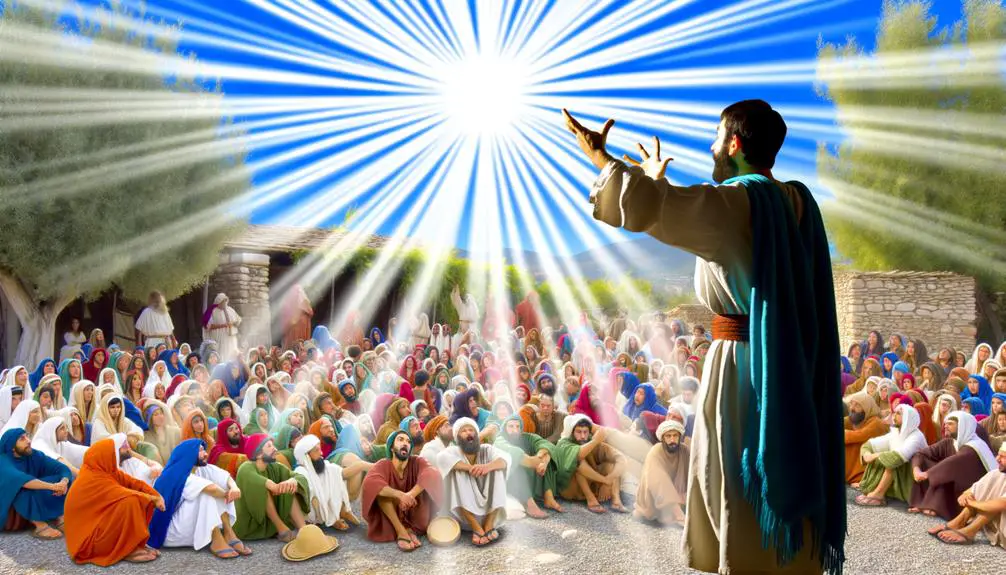Immerse yourself in tales of biblical courage where faith confronts fear—discover what happens next.

Courageous in the Bible
In the Bible, you'll encounter several figures who demonstrate remarkable courage amidst challenging obstacles. Moses, for instance, stood against Pharaoh, driven by divine command and a commitment to justice and freedom. Similarly, Joshua's conquest of Jericho, combining military strategy and faith, marks a pivotal moment of courageous leadership. Deborah's role transcends traditional gender roles, providing strategic and spiritual guidance during important battles. These narratives not only highlight the individual valor but also underscore the profound interplay between faith, leadership, and divine intervention. Exploring these examples further could offer deeper insights into their enduring legacy.
Key Takeaways
- Moses defied Pharaoh, exemplifying courage by standing up against oppression to free the Israelites.
- Joshua led the conquest of Jericho, showing courage through faith and strategic military actions.
- Deborah, as a prophet and leader, courageously guided Barak and unified tribes to secure a key victory.
- Daniel displayed unwavering faith and courage by maintaining his devotion despite the threat of the lion's den.
- Esther bravely approached the king to save her people, risking her life to overturn a decree against the Jews.
Moses Defies Pharaoh

Why did Moses defy Pharaoh, and what does this act reveal about his character? You'll find that Moses' defiance wasn't just a spur-of-the-moment decision; it was a profound stand against tyranny, driven by a deep sense of duty and divine command. This act casts a light on his character, showcasing his courage and unwavering commitment to his people's liberation. Moses faced immense leadership challenges, yet he remained steadfast, guided by a moral compass that valued freedom and justice above his own safety.
The plague consequences that followed his confrontations with Pharaoh were severe, underscoring the gravity of his mission and the stark resistance he faced. Each plague, escalating in intensity, not only demonstrated the power backing Moses but also tested his resilience. You can see that leading a subjugated people against a mighty empire demanded more than just bravery; it required a visionary leader who could foresee the impacts of each action, negotiate under pressure, and sustain the spirit of a beleaguered nation.
Moses' actions and the resulting hardships highlight a pivotal theme: true leadership involves making tough decisions that can bear heavy consequences, yet steering persistently towards a moral vision.
Joshua Conquers Jericho
Following Moses' example of steadfast leadership, Joshua's conquest of Jericho marks another significant episode in Biblical history, where strategic acumen and divine intervention play pivotal roles. You'll find that the narrative, as recounted in the Book of Joshua, blends military tactics with miraculous elements, offering a complex tableau of ancient warfare and faith-driven victory.
As you explore further, you'll notice that Rahab's assistance is vital in the success of the Israelites. Her role as a collaborator inside Jericho provides Joshua with valuable intelligence, fundamentally altering the course of the battle. This act of bravery and faith, despite the risks, underscores the theme of unlikely heroes in the Bible.
Moreover, the trumpet's sound, a key element in the siege, isn't just a signal to the troops; it represents the voice of divine command. The walls of Jericho falling at the sound of trumpets highlight the power of divine intervention when combined with obedience and collective action.
Here's a detailed breakdown that might help you grasp the significance of each element:
Element |
Significance |
|---|---|
Rahab's Role |
Strategic intelligence, alliance |
Trumpet's Sound |
Divine signal, commencement of miracle |
Wall's Collapse |
Manifestation of divine power |
This story isn't just about conquest—it's about faith, strategy, and the unexpected heroes that emerge during pivotal moments in Biblical history.
Deborah Leads Israel

You'll find that Deborah's role as a leader in Israel is not only unique but pivotal in the narrative of the Israelites. Her prophetic leadership, exemplified through her guidance of Barak, underscores a dynamic of reliance and faith that shaped their victory at Mount Tabor. Analyzing these elements provides a deeper understanding of her impact and the theological implications of her leadership in the context of Biblical history.
Deborah's Prophetic Leadership
Deborah's Prophetic Leadership
Guiding Israel through a pivotal period, Deborah's role as a prophet and leader manifests her unique position in biblical history. You'll witness how her prophetic roles challenged traditional gender dynamics, positioning her not just as a spiritual guide but also a political leader. Her leadership was marked by wisdom and courage, characteristics essential for the tumultuous times she navigated.
Aspect |
Detail |
Impact |
|---|---|---|
Prophetic Role |
Oracle and judge of Israel |
Guided spiritual and legal decisions |
Gender Dynamics |
Female leader in a patriarchal society |
Challenged societal norms |
Political Impact |
Unified tribes against common foes |
Strengthened collective identity |
Her story encourages you to explore the intersections of spiritual authority and societal expectations.
Barak's Reliance on Deborah
Relying heavily on Deborah's wisdom and leadership, Barak's success in battle underscores the profound impact of her prophetic guidance on Israel's military strategies. You should note how this alliance between Barak and Deborah exemplifies a shift in traditional gender roles, challenging the norms of their time. Her role was not only spiritual but also tactical, influencing key military decisions. This partnership highlights the essential dynamic of trust and respect necessary for effective leadership, particularly in a patriarchal society. Deborah's involvement went beyond conventional expectations, serving as a catalyst for a more inclusive approach in leadership roles. Her strategic input was pivotal, reinforcing the idea that leadership qualities are not gender-bound but are instead rooted in wisdom and courage.
Victory at Mount Tabor
Led by Deborah, Israel achieved a decisive victory at Mount Tabor, illustrating her pivotal role in directing military engagements and shaping the nation's history. This victory not only marked a significant military success but also highlighted the strategic location of Mount Tabor. Positioned to control important trade routes, the site's strategic advantage was effectively utilized under Barak's leadership, who acted upon Deborah's prophetic guidance. You can observe that their collaboration was instrumental in mobilizing the tribes of Israel against Jabin's forces. The outcome at Mount Tabor didn't just represent a military triumph; it underscored the importance of wise leadership and strategic foresight in overcoming formidable adversaries. This event firmly established Deborah's legendary status and influenced Israel's future military and political strategies.
Gideon's Battle Strategy

Gideon's battle strategy, marked by unconventional tactics, vividly demonstrates how psychological warfare can decisively impact military outcomes. As you explore the context of his confrontation with the Midianites, it's essential to comprehend the role of the fleece test in shaping his approach. This test, a divine sign, not only confirmed God's presence but also underscored the importance of faith and obedience in face of overwhelming odds. Gideon's strategy was tailored to exploit the Midianite tactics, characterized by their raids and use of vast numbers to intimidate and disperse Israelite forces.
His plan involved a mere 300 men, armed with trumpets and torches hidden in jars—a stark contrast to conventional armaments. At his signal, these men broke the jars, revealing the torches and creating a cacophony of sound with their trumpets. This sudden, intense barrage of noise and light was psychologically disarming; it sowed confusion and fear among the Midianites. They turned on each other in the chaos, mistaking their own for the enemy. This clever use of psychological elements, minimal force, and the element of surprise led to a stunning victory, highlighting that sometimes, the battle is won not by strength but by wit and the courage to follow an unconventional path.
David Versus Goliath
While Gideon's tactics showcased the power of psychological warfare, the story of David versus Goliath illustrates how sheer faith and strategic insight can overturn formidable adversaries. You're pulled into this narrative where a young shepherd boy, armed with little more than a sling and his faith in God, confronts a towering giant. This confrontation isn't just a physical battle but a profound demonstration of the shepherd's bravery. As you explore further, you recognize David as the unexpected hero, embodying the triumph of spirit and intellect over brute strength.
David's choice of weapon, a simple shepherd's sling, symbolizes his roots and his understanding of his own strengths. Unlike Saul's armor, which he tries and discards, the sling is familiar and effective in his skilled hands. This choice reflects not only practicality but profound strategic insight—you see that David capitalizes on speed and mobility, exploiting Goliath's cumbersome movements.
His victory reshapes your understanding of power and highlights how faith, combined with astuteness, can level the playing field against seemingly insurmountable odds. David's story encourages you to think about your own 'giants,' urging a reevaluation of how you perceive challenges and adversaries.
Elijah Challenges Prophets

In one of the Bible's most dramatic confrontations, Elijah boldly challenges the prophets of Baal, testing the true power of their gods against the authority of the Lord. You'll find this prophet showdown in 1 Kings 18, a critical juncture where the rampant Baal worship in Israel faces a direct contest from Yahweh's prophet. Elijah's challenge is not just a spectacle; it's a theological examination of whose deity genuinely commands natural elements.
Elijah proposes a test at Mount Carmel involving two altars—one for Baal and one for Yahweh. Each is to call down fire from heaven to ignite their respective sacrificial offerings. The prophets of Baal fervently pray, dance, and even resort to self-mutilation to provoke a response from Baal. Despite their hours of pleading, there is no answer; their efforts reveal Baal's impotence.
Conversely, Elijah's approach is marked by calm certainty. Before he prays, he drenches his sacrifice in water, intensifying the challenge for Yahweh to ignite a wet altar. His prayer is simple yet profound, seeking to turn the hearts of the people back to God. The result is spectacular—fire descends from the sky, consuming Elijah's offering, validating the supremacy of Yahweh and demonstrating the futility of Baal worship. This event decisively shapes Israel's religious landscape and underscores the power of true faith and divine authority.
Daniel in the Lion's Den
As you explore the narrative of Daniel in the Lion's Den, consider the profound implications of Daniel's unwavering faith. His miraculous survival not only accentuates divine intervention but also offers a framework for understanding resilience in the face of seemingly insurmountable challenges. Reflect on what lessons Daniel's bravery imparts regarding the endurance of faith and integrity under pressure.
Daniel's Unwavering Faith
Daniel's unwavering faith is vividly exemplified when he courageously faces the lions in their den, despite the grave risks imposed by his adherence to divine worship. Previously, you've seen Daniel interpret Nebuchadnezzar's dream, showcasing his courage to convey divine messages truthfully, regardless of consequences.
Consider Daniel's actions in this table:
Aspect |
Description |
|---|---|
Faithfulness |
Continued prayer despite the king's decree |
Courage |
Faced lions rather than compromise his beliefs |
Integrity |
Maintained consistent worship practices |
Wisdom |
Trusted in God's deliverance |
Resilience |
Stood firm in faith under dire threat |
Your understanding of these qualities can inspire you to emulate such steadfastness in your spiritual and everyday challenges.
Miraculous Survival Explained
The miraculous survival of Daniel in the lion's den demonstrates divine intervention at its clearest, revealing the potency of unwavering faith amidst life-threatening trials. When you consider this historic event, a few critical elements stand out:
- Divine Protection: Daniel's safety wasn't due to his own survival instincts; rather, it was a clear act of divine intervention.
- Faithfulness: His steadfast faith in the face of danger was essential. It wasn't just passive hope; it was an active trust in God.
- God's Sovereignty: The event underscores the belief that God has ultimate control over nature and circumstances.
- The Power of Prayer: Daniel's consistent prayer life before and during the ordeal played a pivotal role in his preservation.
This narrative isn't just about survival; it's a profound indication of the power of divine intercession.
Lessons From Daniel's Bravery
Exploring Daniel's bravery in the lion's den, we learn that true courage often stems from profound faith, not merely from human strength. Daniel's experience is a monumental lesson in facing life's fiercest challenges with unwavering faith. His ability to interpret dreams, a gift of divine origin, further exemplified his reliance on spiritual guidance over human wisdom.
Aspect |
Details |
Impact on Daniel |
|---|---|---|
Faith |
Unyielding belief in God |
Courage under threat |
Dream Interpretation |
Divine wisdom guidance |
Foreseeing and successfully overcoming challenges |
Peer Pressure |
Resisting royal decree |
Maintaining integrity |
Divine Protection |
Survival in the den |
Strengthening faith |
Legacy |
Inspiring future generations |
Timeless example of bravery |
Daniel's story teaches you that standing firm in your convictions, especially when faced with peer pressure, transforms potential peril into a testimony of faith and divine protection.
Esther's Risky Petition
Esther's courageous decision to approach King Xerxes, despite the potential for severe personal consequences, highlights a pivotal moment in her story. In the heart of Persia's politics, she dared to intervene not just for herself but for her entire people. Imagine yourself in her shoes, at a royal banquet, the air thick with the weight of impending decisions.
Here's why Esther's petition is a masterclass in bravery and wisdom:
- Understanding Power Dynamics: Esther knew the risk of approaching the king unsummoned, which could have led to her death. Yet, she calculated her move strategically, using her position and the king's favor to her advantage.
- Timing Her Request: She didn't present her plea at the first banquet but waited until the second, building suspense and curiosity in the king.
- Creating a Personal Connection: By inviting Haman to the banquets, Esther personalized the political conflict, making it harder for the king to ignore her plea.
- Articulating the Stakes Clearly: When she finally made her request, it was direct and poignant, emphasizing the threat to her and her people, which spurred the king into action.
Esther's story isn't just a tale from the past; it's a lesson in courage, strategy, and the art of persuasion.
Peter's Bold Preaching

In his bold preaching, Peter fearlessly proclaimed the risen Christ, defying the very authorities that had crucified Him. This apostolic transformation from a simple fisherman to a foundational pillar of the early church is nothing short of remarkable. You can see how his sermons impacted not just the immediate audience, but also rippled through the ages, influencing countless believers. His courage set a precedent for what it means to stand unwaveringly for one's faith.
Peter's sermons were not just declarations of faith, but also confrontations with the socio-political structures of the time. He didn't just speak to inform, but to transform. His words carried the power of conviction and the hope of resurrection, challenging his listeners to rethink their positions and to embrace a transformed life.
Here's a glimpse into the key aspects of Peter's preaching:
Aspect |
Description |
Impact |
|---|---|---|
Apostolic Zeal |
Fervent proclamation of the gospel |
Empowered the nascent Christian community |
Confrontation |
Direct challenge to Jewish and Roman leaders |
Stirred political and religious reevaluation |
Hope and Promise |
Assurance of salvation through Christ |
Fostered spiritual renewal and growth |
Understanding these elements, you begin to grasp the depth and breadth of Peter's influence through his bold, transformational speeches.
Frequently Asked Questions
How Is Courage Defined in Different Biblical Contexts?
You'll find that courage in various narratives isn't just about bold actions. It's often shaped by divine encouragement and prophetic bravery, reflecting a deeper, spiritual resilience rather than mere physical or moral fortitude.
What Other Biblical Characters Showed Courage Through Peaceful Actions?
You'll find Daniel's unwavering faithfulness and Joseph's steadfast integrity as prime examples of courage manifested through peaceful actions, highlighting their spiritual and moral fortitude in the face of adversity.
How Does Courage in the Bible Influence Modern Christian Life?
You may find that stories of bravery inspire faith-driven decisions and leadership roles in your life, mirroring age-old narratives that continue to guide and influence modern Christian practices and values.
Are There Examples of Women Showing Courage in the New Testament?
Yes, the New Covenant includes courageous women such as female apostles and those in prophetic roles. These figures exemplify strength and resilience, influencing roles and perceptions of women in early Christian communities.
How Do Biblical Teachings on Courage Relate to Facing Personal Fears Today?
Biblical teachings on courage emphasize fear management and spiritual resilience, offering you timeless strategies to confront personal fears with faith and determination, enhancing your ability to navigate life's challenges with inner strength.



Sign up